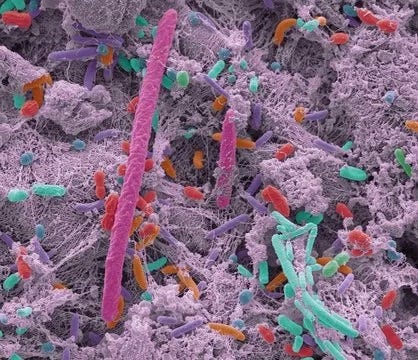June 29, 2024 | Health Prepping: Microbiome Maintenance is Key to…Everything

Among the keys to a long, healthy life are exercise, sunshine, and not smoking. But the most important of all might be maintaining a balanced microbiome. Here’s a quick primer:
The term “microbiome” refers to the trillions of bacteria, viruses, fungi, and other microscopic living things that exist mainly inside our intestines and on our skin.
There are actually more bacterial cells in our bodies than human cells (40 trillion versus 30 trillion). Around 1,000 species of bacteria live in the typical human gut, and together they regulate virtually everything from weight to mental health to disease resistance.
Yet the average doctor does zero investigation into his patients’ microbiomes while the average person has no idea how to maintain theirs.
The result is that the typical American microbiome is like a garden overrun with weeds, producing the wrong chemicals and making its host fat, sick, and stupid.

The Solution
We should respond by adopting our great-grandparents’ eating habits, which means avoiding processed foods. Anything with a long list of ingredients probably messes with our microbiomes. So…
- Replace frozen pizzas and sugary breakfast cereals with organic vegetables and meat and wild-caught fish.
- Eliminate both sugary and artificially sweetened sodas. They’re fertilizer for bad bacteria.
- Breast-feed babies to allow them to replicate their mothers’s microbiome.
- Avoid antibiotics (or factory-farmed meat that contains antibiotics) unless it’s a life-threatening situation.
- Go heavy on “pre-biotic” dietary fiber, which is fertilizer for good bacteria. Sources include bananas, asparagus, oats, and apples.
- Eat fermented foods like yogurt, sauerkraut, and kefir, which contain healthy bacteria.
Here’s a piece of research that just dropped this week:
Study uncovers the gut-brain connection in Parkinson’s
(Epoch Times) – A team of Japanese scientists has uncovered an unexpected link between the gut and the brain. The discovery may offer fresh insights into managing a condition that affects 9 million people worldwide.
Deficiency of 2 B Vitamins Linked to Parkinson’s
Researchers used shotgun sequencing to analyze stool samples, allowing them to identify changes in the microbial community and genetic makeup. The study found fewer genes in Parkinson’s patients’ gut bacteria responsible for making vitamins B2 (riboflavin) and B7 (biotin). Both have anti-inflammatory properties and may help counteract the neuroinflammation associated with Parkinson’s disease.
This suggests that B vitamin supplementation could potentially relieve Parkinson’s symptoms and even slow disease progression, Hiroshi Nishiwaki, the lead study author, said in a press release.
The study demonstrates the importance of the gut microbiome in the progression and initiation of Parkinson’s disease, a theory first hypothesized more than 20 years ago.
Further Research
We’ve barely scratched the surface here. For more, consider:
Gut microbiome discovery provides roadmap for life-saving cancer therapies
Your gut microbes may influence how you handle stress
Super Gut: A four-week plan to reprogram your microbiome
The Microbiome Connection: Your Guide to IBS, SIBO, and Low-Fermentation Eating
STAY INFORMED! Receive our Weekly Recap of thought provoking articles, podcasts, and radio delivered to your inbox for FREE! Sign up here for the HoweStreet.com Weekly Recap.
John Rubino June 29th, 2024
Posted In: John Rubino Substack











